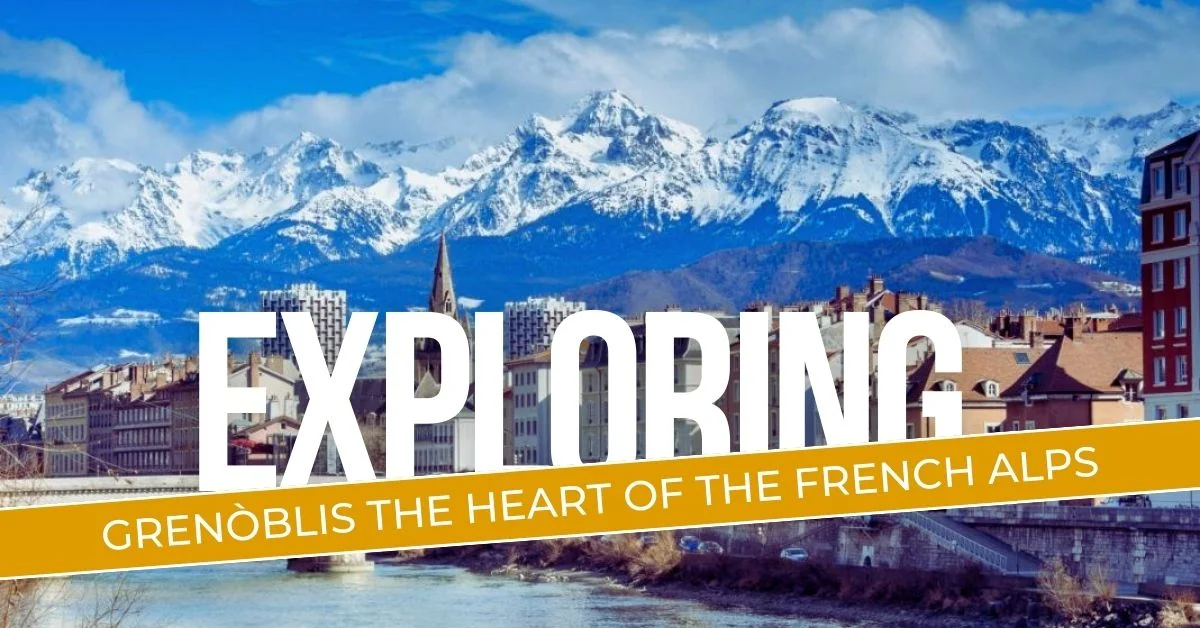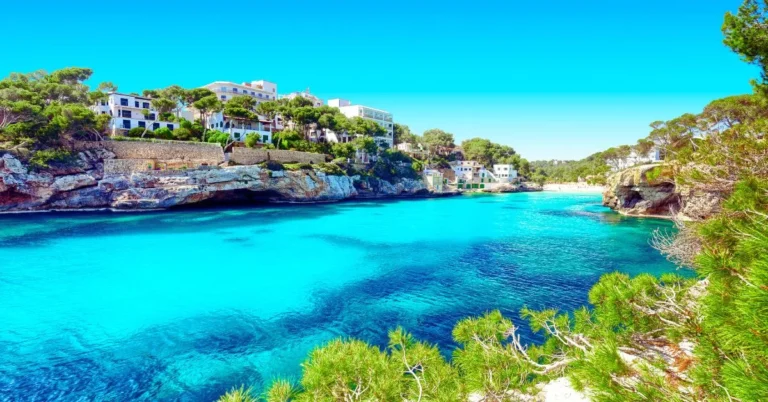Grenòblis (Grenoble): The Heart of the French Alps
Nestled in the picturesque valley surrounded by the majestic French Alps, Grenoble, historically known as Grenòblis, is a city that embodies a rich tapestry of history, culture, innovation, and natural beauty. This article explores the multifaceted character of Grenoble, from its historical significance and cultural landmarks to its role as a hub for science and technology, and its status as a haven for outdoor enthusiasts.
Historical Significance
A Brief History of Grenoble
Grenoble’s history dates back to over 2,000 years. Originally known as Cularo, the city was a small Gallic village before becoming a significant Roman settlement. Throughout the centuries, Grenoble evolved into an important hub during the French Revolution and later became a centre of resistance during World War II. The city’s rich history is reflected in its architecture, museums, and historical sites.
Also, read The Rich History of Barcelia
The Influence of the Dauphiné Region
Grenoble is the historical capital of the Dauphiné region. The region’s unique cultural and historical influence is evident throughout the city. The Dauphiné’s legacy is particularly visible in Grenoble’s old town, known as Vieille Ville, where medieval buildings and narrow cobblestone streets create a picturesque setting.
Grenoble in the 19th Century
The 19th century marked a period of significant growth and development for Grenoble. The city underwent extensive urban planning, leading to the construction of new roads, buildings, and public spaces. This era also saw the establishment of important cultural institutions, including museums and theatres, which continue to enrich the city’s cultural landscape.
Cultural Landmarks
Museums and Galleries
Grenoble is home to an array of museums and galleries that reflect its rich cultural heritage. The Musée de Grenoble, one of the most prestigious art museums in France, houses an impressive collection of European paintings, including works by Rubens, Gauguin, and Picasso. The museum’s modern and contemporary art collection is equally remarkable, featuring pieces by artists such as Andy Warhol and Joan Miró.
Fort de la Bastille
One of Grenoble’s most iconic landmarks is the Fort de la Bastille, perched on a hill overlooking the city. The fort is accessible via a scenic cable car ride, offering panoramic views of Grenoble and the surrounding mountains. The site includes historical exhibits, walking trails, and opportunities for adventure sports like paragliding and rock climbing.
Festivals and Events
Grenoble’s vibrant cultural scene is further enhanced by its numerous festivals and events. The Grenoble Jazz Festival, held annually, attracts world-renowned jazz musicians and enthusiasts from around the globe. The city’s rich cinematic history is celebrated at the Festival du Film Court en Plein Air de Grenoble, one of the oldest short film festivals in the world.
Must-Visit Attractions in Grenoble
The Bastille: A Fortress with Panoramic Views
One of Grenoble’s most iconic landmarks is the Bastille, a hilltop fortress offering breathtaking panoramic views of the city and the surrounding Alps. Visitors can reach the Bastille by hiking up the well-marked trails or by taking the Grenoble-Bastille Cable Cars. The cable car ride itself is a delightful experience, providing stunning aerial views of Grenoble and the Isère River.
Science and Technology Hub
Research and Innovation
Grenoble is often referred to as the “Silicon Valley of the French Alps” due to its significant contributions to science and technology. The city is home to several prestigious research institutions, including the Grenoble Institute of Technology (Grenoble INP) and the European Synchrotron Radiation Facility (ESRF). These institutions are at the forefront of research in fields such as nanotechnology, biotechnology, and renewable energy.
CEA Grenoble and MINATEC
The French Alternative Energies and Atomic Energy Commission (CEA) in Grenoble is a leading research centre focused on energy, defence, and information technologies. Adjacent to CEA Grenoble is MINATEC, a campus dedicated to innovation in micro and nanotechnology. MINATEC brings together researchers, students, and industry professionals to collaborate on cutting-edge technologies.
Grenoble Innovation for Advanced New Technologies (GIANT)
The GIANT Innovation Campus is a collaborative initiative aimed at fostering innovation and research in Grenoble. It brings together key players in academia, industry, and research to address global challenges in energy, health, and information technology. This collaborative environment has made Grenoble a magnet for researchers and entrepreneurs from around the world.
Museums in Grenoble: A Journey Through Time
Musée de Grenoble
The Musée de Grenoble is one of France’s most prestigious art museums. It houses an impressive collection of artworks ranging from ancient times to contemporary pieces. The museum’s diverse collection includes works by renowned artists such as Picasso, Matisse, and Monet.
Musée Dauphinois
For those interested in the cultural and historical heritage of the Dauphiné region, the MuséeDauphinois is a must-visit. Located in a former convent, this museum offers fascinating exhibits on the region’s history, culture, and traditions.
Grenoble Archaeological Museum
The Grenoble Archaeological Museum provides a deep dive into the city’s ancient past. The museum is located on the site of a Gallo-Roman necropolis and features well-preserved archaeological finds that offer insights into Grenoble’s early history.
Natural Beauty and Outdoor Activities
The French Alps
Grenoble’s location at the foot of the French Alps makes it a paradise for outdoor enthusiasts. The surrounding mountains offer a wide range of activities, from skiing and snowboarding in the winter to hiking, mountain biking, and paragliding in the summer. The nearby Vercors, Chartreuse, and Belledonne mountain ranges provide a stunning backdrop for these activities.
Parks and Green Spaces
Within the city, numerous parks and green spaces offer residents and visitors a place to relax and enjoy nature. The Parc Paul Mistral, one of the largest urban parks in Grenoble, features beautiful gardens, walking paths, and sports facilities. The Jardin de Ville, located in the heart of the city, is a historic garden that dates back to the 17th century.
The Isère River
The Isère River flows through Grenoble, adding to the city’s scenic beauty. The riverbanks have been developed into promenades and recreational areas, where people can enjoy walking, cycling, and picnicking. The river also offers opportunities for water sports such as kayaking and canoeing.
Education and Academia
Universities and Higher Education
Grenoble is renowned for its educational institutions, making it a leading centre for higher education in France. The Université Grenoble Alpes (UGA) is one of the largest and most prestigious universities in the country, offering a wide range of programs in sciences, humanities, and social sciences. The city’s academic environment attracts students from around the world, contributing to its vibrant and diverse community.
International Collaborations
Grenoble’s academic institutions maintain strong international collaborations, enhancing the city’s reputation as a global centre for education and research. These collaborations include student exchange programs, joint research projects, and partnerships with universities and research centres worldwide.
Innovation in Education
In addition to traditional academic programs, Grenoble is known for its innovative approaches to education. The city embraces new technologies and teaching methods to provide students with a cutting-edge education. This commitment to innovation is evident in initiatives such as Grenoble Ecole de Management, which integrates technology and entrepreneurship into its curriculum.
Economic Development
Industrial Sector
Grenoble’s economy has traditionally been driven by its industrial sector. The city’s strategic location and access to hydroelectric power have made it a hub for industries such as electronics, chemicals, and machinery. Companies like Hewlett-Packard and Schneider Electric have established significant operations in Grenoble, contributing to its economic growth.
Startups and Entrepreneurship
In recent years, Grenoble has emerged as a hotspot for startups and entrepreneurship. The city’s supportive ecosystem, which includes incubators, accelerators, and co-working spaces, has fostered the growth of numerous innovative startups. The presence of leading research institutions and a highly educated workforce further supports the entrepreneurial spirit in Grenoble.
Tourism and Hospitality
Tourism plays a vital role in Grenoble’s economy, with visitors drawn to its historical sites, cultural attractions, and natural beauty. The city’s hospitality industry has flourished, offering a range of accommodations, from luxury hotels to cosy bed-and-breakfasts. Grenoble’s culinary scene, known for its delicious Alpine cuisine, also attracts food enthusiasts.
Transportation and Accessibility
Public Transportation
Grenoble boasts an efficient and extensive public transportation system, making it easy for residents and visitors to navigate the city. The Grenoble tramway network, one of the most modern in France, connects key areas of the city and surrounding suburbs. Additionally, a comprehensive bus network complements the tram system, providing convenient transportation options.
Sustainable Mobility
Grenoble is committed to sustainable mobility and has implemented various initiatives to reduce its carbon footprint. The city promotes cycling through an extensive network of bike lanes and bike-sharing programs. Electric buses and trams are also part of Grenoble’s efforts to promote environmentally friendly transportation.
Connectivity
Grenoble’s strategic location provides excellent connectivity to other major cities in France and Europe. The city is well-connected by rail, with high-speed trains (TGV) linking it to Paris, Lyon, and other major cities. Grenoble Alpes-Isère Airport offers flights to various European destinations, enhancing its accessibility for international travellers.
Car Rentals and Driving Directions
For those who prefer to explore at their own pace, car rentals are readily available in Grenoble. Major rental companies have offices in the city, and driving directions to popular destinations are easy to follow. The city’s road network is well-maintained, and parking is available in most areas.
Booking Accommodations
Grenoble offers a wide range of accommodation options to suit different budgets and preferences. From luxury hotels to budget-friendly hostels, visitors can find suitable lodging that meets their needs. It’s advisable to book accommodations in advance, especially during peak tourist seasons.
Living in Grenoble
Quality of Life
Grenoble offers a high quality of life, combining the benefits of a vibrant urban environment with the beauty of nature. The city’s residents enjoy a wide range of cultural, recreational, and educational opportunities. Grenoble’s healthcare system is highly regarded, with several hospitals and medical facilities providing excellent care.
Multicultural Community
Grenoble is known for its multicultural community, with residents from diverse backgrounds contributing to its cosmopolitan atmosphere. The city’s international population includes students, researchers, and professionals from around the world, creating a rich and diverse cultural tapestry.
Cost of Living
The cost of living in Grenoble is relatively moderate compared to other major French cities. Housing options range from modern apartments in the city centre to charming houses in the suburbs. The availability of public transportation and amenities ensures that residents can enjoy a comfortable and convenient lifestyle.
Future Prospects
Sustainable Development
Grenoble is committed to sustainable development and has implemented various initiatives to promote environmental sustainability. The city has set ambitious goals to reduce greenhouse gas emissions and increase the use of renewable energy. Urban planning projects focus on creating green spaces and promoting sustainable transportation.
Innovation and Research
Grenoble’s future prospects are closely tied to its strength in innovation and research. The city’s institutions continue to push the boundaries of science and technology, attracting top talent and fostering groundbreaking discoveries. The ongoing collaboration between academia, industry, and government ensures that Grenoble remains at the forefront of innovation.
Economic Growth
Grenoble’s economy is expected to continue its growth trajectory, driven by its diverse industrial base and thriving startup ecosystem. The city’s strategic initiatives to attract investment and support entrepreneurship will further enhance its economic prospects. Additionally, Grenoble’s appeal as a tourist destination is likely to boost the local economy.
Tips for Making the Most of Your Visit
Best Times to Visit Grenoble
The best time to visit Grenoble depends on your interests. For skiing and winter sports, the winter months from December to February are ideal. If you prefer hiking and outdoor activities, the spring and summer months from May to September offer pleasant weather and beautiful landscapes.
Navigating the City
Grenoble is a pedestrian-friendly city, and many of its attractions are within walking distance of each other. The city’s compact layout makes it easy to explore on foot. Bicycles are also a popular mode of transportation, with numerous bike rental stations available.
Capturing the Perfect Pictures
Grenoble’s scenic beauty provides countless opportunities for photography. Whether it’s capturing the panoramic views from the Bastille, the charming streets of the old town, or the serene landscapes along the Isère River, visitors will find plenty of picture-perfect moments.
Conclusion
In summary, Grenoble, or Grenòblis, is a city that seamlessly blends its rich historical heritage with modern innovation and natural beauty. Its strategic location, vibrant cultural scene, and commitment to education and research make it a unique and dynamic destination. Whether you are a history buff, an outdoor enthusiast, or a tech aficionado, Grenoble has something to offer everyone. As the city continues to evolve, its prospects for the future remain bright, solidifying its status as the heart of the French Alps and a beacon of progress and sustainability.
Read more about Masqlaseen: A Spiritual and Cultural Hub in Morocco
here are more places you should visit there
FAQs:
What is the historical significance of Grenoble?
Grenoble, originally known as Cularo, has over 2,000 years of history and medieval heritage, including the Grenoble Cathedral.
What are some key cultural landmarks in Grenoble?
Key landmarks include the Musée de Grenoble and Fort de la Bastille.
Why is Grenoble considered a science and technology hub?
Grenoble is home to prestigious research institutions like Grenoble INP and the European Synchrotron Radiation Facility.
What outdoor activities can be enjoyed in Grenoble?
Activities include skiing, hiking, mountain biking, and paragliding in the surrounding French Alps.
How does Grenoble promote sustainable mobility?
Grenoble promotes cycling with extensive bike lanes and bike-sharing programs, and uses electric buses and trams.







